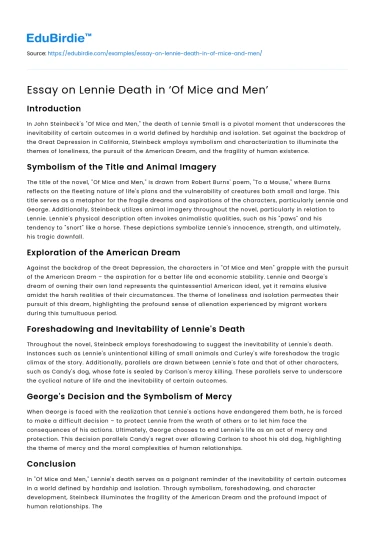Introduction
In John Steinbeck's "Of Mice and Men," the death of Lennie Small is a pivotal moment that underscores the inevitability of certain outcomes in a world defined by hardship and isolation. Set against the backdrop of the Great Depression in California, Steinbeck employs symbolism and characterization to illuminate the themes of loneliness, the pursuit of the American Dream, and the fragility of human existence.
Symbolism of the Title and Animal Imagery
The title of the novel, "Of Mice and Men," is drawn from Robert Burns' poem, "To a Mouse," where Burns reflects on the fleeting nature of life's plans and the vulnerability of creatures both small and large. This title serves as a metaphor for the fragile dreams and aspirations of the characters, particularly Lennie and George. Additionally, Steinbeck utilizes animal imagery throughout the novel, particularly in relation to Lennie. Lennie's physical description often invokes animalistic qualities, such as his "paws" and his tendency to "snort" like a horse. These depictions symbolize Lennie's innocence, strength, and ultimately, his tragic downfall.
Save your time!
We can take care of your essay
- Proper editing and formatting
- Free revision, title page, and bibliography
- Flexible prices and money-back guarantee
Exploration of the American Dream
Against the backdrop of the Great Depression, the characters in "Of Mice and Men" grapple with the pursuit of the American Dream – the aspiration for a better life and economic stability. Lennie and George's dream of owning their own land represents the quintessential American ideal, yet it remains elusive amidst the harsh realities of their circumstances. The theme of loneliness and isolation permeates their pursuit of this dream, highlighting the profound sense of alienation experienced by migrant workers during this tumultuous period.
Foreshadowing and Inevitability of Lennie's Death
Throughout the novel, Steinbeck employs foreshadowing to suggest the inevitability of Lennie's death. Instances such as Lennie's unintentional killing of small animals and Curley's wife foreshadow the tragic climax of the story. Additionally, parallels are drawn between Lennie's fate and that of other characters, such as Candy's dog, whose fate is sealed by Carlson's mercy killing. These parallels serve to underscore the cyclical nature of life and the inevitability of certain outcomes.
George's Decision and the Symbolism of Mercy
When George is faced with the realization that Lennie's actions have endangered them both, he is forced to make a difficult decision – to protect Lennie from the wrath of others or to let him face the consequences of his actions. Ultimately, George chooses to end Lennie's life as an act of mercy and protection. This decision parallels Candy's regret over allowing Carlson to shoot his old dog, highlighting the theme of mercy and the moral complexities of human relationships.
Conclusion
In "Of Mice and Men," Lennie's death serves as a poignant reminder of the inevitability of certain outcomes in a world defined by hardship and isolation. Through symbolism, foreshadowing, and character development, Steinbeck illuminates the fragility of the American Dream and the profound impact of human relationships. The novel's enduring themes continue to resonate with readers, offering a timeless exploration of human nature and the pursuit of hope amidst adversity.






 Stuck on your essay?
Stuck on your essay?

